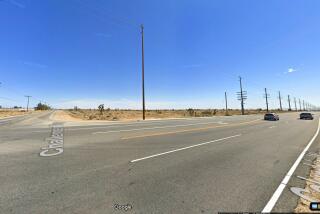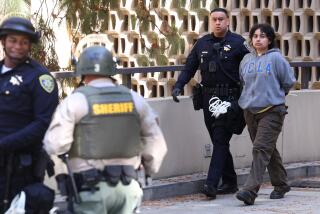Law and Orders
Jaime Randall got her first taste of the California Highway Patrol as a 15-year-old cashier at her parents’ Laguna Hills carwash, where officers often rolled up to get their cruisers and motorcycles cleaned.
“They told me about the kind of work that they do,” she said. “I liked it.”
Three years later, the San Juan Capistrano woman is spending part of her summer in the flatlands of Riverside County, enduring the shouting orders of a drill instructor, rising at 4 a.m. each day for exercise and learning the art of writing a speeding ticket.
Randall is part of the CHP’s 1998 Explorers program, which gives teenagers and young adults a chance to learn about policing and receive professional training before deciding whether to make a career in law enforcement.
Randall and the other Explorers meet twice a month with CHP officers to study patrol techniques and take part in simulated accident scenes and drunk-driving checkpoints.
But the highlight of the program occurred in recent weeks, when the Explorers traveled to March Air Force Base near Riverside to undergo eight days of intense physical and academic training.
Organizers say only 5% to 10% of the cadets go on to become California Highway Patrol officers. “If we can get some good citizens out of [the rest], we’ve done a good job,” said Sgt. Andy Sechrist, the cadets’ drill instructor.
*
On a Thursday morning, at 5 sharp, half of the roughly 90 Explorers emerged one by one out of a thick fog that had settled over the base. Their last names were scrawled on the backs of their T-shirts.
Jogging single file, they arranged their room keys into a neat pile and took their positions an arm’s length from one another on a wet square of grass.
Their tidy pile of keys was then kicked into a jumble by drill sergeants overseeing the “physical stress” exercise. Sechrist began the calisthenics with jumping jacks as three other instructors weaved through the cadet lines.
In the middle of the second set, an instructor put her nose in the face of Explorer Nicole Ryan of Riverside, whose pep had begun to fade.
“Why are you not counting off, Ryan?” the instructor shouted. “Would you rather do push-ups?” Ryan, a bit shaken, got progressively louder, and after 20 energetic jumping jacks, the instructor moved on.
Sechrist gave the “down” command and the Explorers quickly dropped. They knew that a task not performed quickly enough would have to be repeated. “Bring your left leg behind,” Sechrist began. All but one cadet immediately folded his or her left leg.
“Left! Left! That would be your C-H-P left!” Sechrist screamed, his voice cracking from previous attempts to get his point across.
“This is to teach them to do CHP physical tasks while being stressed out,” Officer Chris Johnson explained, watching from the sidelines. “This is about having to fight to keep your composure. You need to learn how to have control of your body and your mind even under these circumstances.”
Or, as Sechrist later noted: “You have to be able to take abuse from the public.”
Organizers said some of the cadets underestimate the demands of policing before they enter the program. “We live in the ‘CHiPs’ era,” Sechrist said, referring to the television show. “The perception is, ‘I’m cool. . . . I’m Jon and Ponch, this is so easy.’ It’s all shooting guns and fast cars. But then they find out that for every five minutes of action there’s an hour and a half of paperwork. . . . They’ve got some pretty wide eyes now.”
While some Explorers were drawn to the program by television, others were inspired by their interactions with police.
Growing up in Whittier, Elizabeth “Eliza” Gonzalez’s first experience with officers was positive. “I live in kind of a rough neighborhood. The [sheriff’s deputies] went into the park and cleaned it up,” she said. “I would see them all the time. They were doing a really good job.”
Gonzalez said she learned much from the deputies she met. She asked them about getting involved in law enforcement and they recommended Explorers. When she heard about the CHP program in Santa Ana, she wanted in.
“If you can get through, it’s a good accomplishment,” Gonzalez said, adding that her family has supported her efforts. “My father only went to sixth grade and my mother [high school]. They’re all, ‘My daughter wants to be an officer,’ all proud,” she said, grinning.
Gonzalez and other Explorers said the experience taught them about teamwork and helping each other.
This camaraderie was on display one day when the cadets were awaiting inspection. While in line, a cadet looked over both shoulders to make sure the coast was clear. He then reached out and carefully refolded the rumpled lapel of the cadet in front of him, assuring that his colleague would pass muster.
*
All the Explorer training paid off Monday as the training camp came to an end.
In front of their families and friends, in 108-degree temperatures, they underwent a 20-minute inspection by CHP brass.
They then marched into the base’s conference center to accept their certificates in air-conditioned comfort.
“Ninety-eight of you came here for a week of intense training,” Ed Gomez, the CHP’s southern division chief, told the cadets during his closing address. “Ninety-two of you can sit here today and claim, ‘I’ve done it. I was tested. I survived and I achieved.’ ”
Some Explorers, while tired, already were looking forward to the next training phase, scheduled for later this year in Sacramento.
Randall’s mother, Patricia Singer, followed her daughter around the grassy area outside the barracks as Randall took pictures with her drill sergeants and colleagues.
“It’s really overwhelming. It’s exciting,” Singer said, trying to picture her daughter as a CHP officer. “But I still think of the first time I realized she’d have to get a bulletproof vest. You don’t think of your daughter in one of those.”
More to Read
Sign up for Essential California
The most important California stories and recommendations in your inbox every morning.
You may occasionally receive promotional content from the Los Angeles Times.










